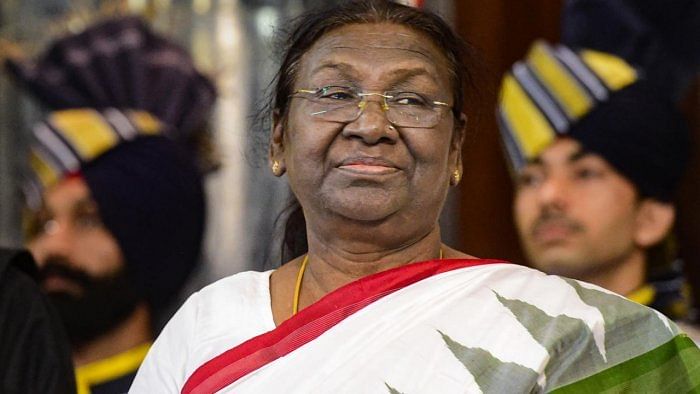
In her inaugural address, our very first tribal president spoke of the special relationship the tribal community enjoys with nature, taking "necessary resources from it" and simultaneously "serving it with equal reverence". It is this very relationship that has been the basis of bitter and prolonged conflict in our country as tribals have tried to hold on to forests and lands that sustain them against a State eager to lay their hands on the treasures that lie underneath. These conflicts have erupted since Independence but have intensified since the turn of the century. Currently, such struggles are being waged not only in Droupadi Murmu's home state of Odisha, but across the tribal heartland that lies in Jharkhand and Chhattisgarh.
In Odisha, tribals have been arrested all through this year for opposing projects large and small: from a giant steel project to a road overbridge being made by the railways. Interestingly, though the BJP, the party that Murmu hails from, is in the Opposition here, reports do not show that it has supported the tribals. The steel plant is being built on the same site where the South Korean steel giant POSCO was to come up. The BJP was an ally of the BJD's Naveen Patnaik in 2005 when an MOU was signed with POSCO; but even after the two parties split and the BJP sat in the Opposition in 2009, it remained aloof from the tribals' 12-year-long struggle against POSCO.
Indeed, the BJP is not known for its support of tribal struggles anywhere. Its record has been quite the opposite. The infamous anti-Maoist campaign Salwa Judum was backed by the BJP government of Raman Singh. A 2009 report of a committee appointed by the Union Ministry of Rural Development described the situation in Chhattisgarh as a "civil war like situation…an open war between brothers… (which) will go down as the biggest land grab ever…640 villages burnt to the ground and emptied with the force of the gun and the blessings of the State. 350,000 tribals…displaced, their womenfolk raped, their daughters killed, their youth maimed. Those who could not escape herded together into refugee camps…." In its judgment ordering an end to Salwa Judum in 2011, the Supreme Court invoked "Heart of Darkness", Joseph Conrad's novel about the colonial rule in Africa. Said the apex court: "The respondents (the Chhattisgarh government)…were seeking to put us on a course of constitutional actions whereby we would also have to (like Conrad's hero) exclaim, at the end of it all: "the horror, the horror."
Also Read—Furore over 'Rashtrapatni' remark reignites debate over gender-neutral term for head of the State
Again, it was a BJP government in Jharkhand that arrested journalist and activist Dayamani Barla, known for leading struggles against steel plants and dams that would have displaced her people. And among the 16 intellectuals and activists charged with sedition by the NIA in the Bhima Koregaon case are two who gave up lives of privilege to devote their lives to tribals: advocate Sudha Bharadwaj of Chhattisgarh and Father Stan Swamy of Jharkhand. The 84-year-old Jesuit died in custody last year.
So when the BJP goes to town over its nomination of a tribal woman as president, you wonder what it means. While all governments have inflicted unmentionable atrocities on tribals and especially tribal women, it is the Modi-led Union government that has tried to dilute laws meant to protect tribal rights to such an extent that the Governor of Jharkhand, a BJP appointee, returned two Bills amending tribal laws in 2017. That Governor was Droupadi Murmu.
Can we hope to see such concern for tribal rights from Droupadi Murmu as president? She returned the Bills after widespread protests against them had spread across Jharkhand, where tribes constitute 26 per cent. Her action brought a sense of relief even to the state BJP, who was unnerved by the protests. The party's anti-tribal measures were seen as one reason for its defeat in the 2019 state Assembly elections.
But similar tribal protests confined to individual states may not have the same impact on the Head of State of the entire country. Tribal issues hardly make news; resistance to the takeover of tribal land may go on for years and yet not impinge on the consciousness of the privileged urban middle class simply because it's so far away. Add to that the mainstream media's tendency to portray such projects as essential for "infrastructural development", which, going by experience, never benefits the tribals displaced by them. Given these two factors, only a president genuinely committed to a largely invisible section of citizens would have the courage to go against the Centre.
Will our first tribal president turn out to be that extraordinary?
(Jyoti Punwani is a journalist)
Disclaimer: The views expressed above are the author's own. They do not necessarily reflect the views of DH.